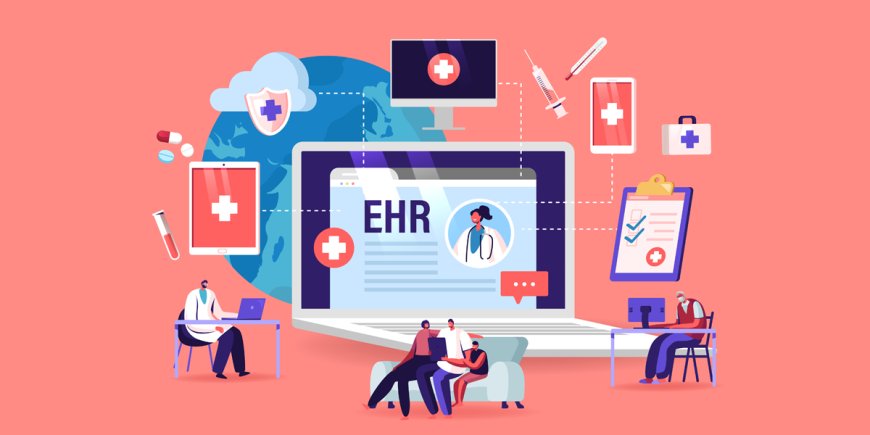What Are the Custom Solutions for Behavioral Health Clinic Management?
Custom solutions for behavioral health clinic management streamline operations, enhance patient care, and ensure compliance with industry regulations. These include specialized EHRs, telehealth tools, billing systems, and workflow automation tailored to mental health services.

Behavioral health clinics are at the forefront of addressing mental health challenges, offering care and support for individuals facing issues such as anxiety, depression, addiction, and trauma. Unlike general healthcare facilities, these clinics deal with deeply personal, sensitive matters and often require complex treatment plans involving multiple providers. To ensure effective management, custom solutions tailored to the unique needs of behavioral health clinics have become indispensable. These solutions are designed to streamline operations, improve patient care, and meet regulatory standards.
Tailored Electronic Health Records (EHR) Systems
Traditional EHRs designed for general medicine often fall short in behavioral health settings. That’s why choosing the best Electronic Health Record system—one specifically built for behavioral health clinics—is vital. These systems support specialized workflows such as psychotherapy notes, DSM-5 diagnostic criteria, substance use assessments, and treatment planning. Templates for progress notes, group therapy documentation, and crisis intervention can be customized to fit each provider's approach. Additionally, these platforms typically include outcome tracking tools to measure patient improvement over time, offering a data-driven way to assess care quality.
Enhanced Appointment Scheduling and Telehealth Integration
Managing appointments in a behavioral health setting can be particularly complex. Patients often need regular sessions, sometimes weekly, with different types of professionals. Custom scheduling tools simplify this process by supporting recurring appointments, managing multi-provider calendars, and reducing no-shows with automated reminders. Furthermore, integrated telehealth functionality is now essential. Custom platforms offer HIPAA-compliant video conferencing designed specifically for therapy and counseling, enabling clinics to reach patients remotely without compromising the quality of care.
Patient Portals and Mobile Accessibility
Engaging patients in their care can significantly enhance outcomes. With custom patient portals, behavioral health clinics can provide secure, user-friendly access to appointments, therapy notes (when appropriate), medication plans, and progress tracking tools. These portals often include secure messaging features for direct communication between patients and providers. With the growing use of smartphones, mobile accessibility ensures patients can conveniently manage their treatment plans, receive reminders, and even complete self-assessments from anywhere.
Behavioral Health-Specific Billing and Insurance Management
Billing in behavioral health care is markedly different from general healthcare. From group sessions and therapy bundles to telehealth reimbursement and sliding scale fees, the complexities require specialized tools. Custom billing solutions are designed to handle these nuances efficiently. They support automated claims submission, track prior authorizations, manage various payor contracts, and help reduce coding errors. These systems also help improve reimbursement rates by ensuring accurate billing practices tailored to mental health services.
Compliance and Confidentiality Management
Confidentiality is at the heart of behavioral health care. Clinics must comply with strict federal and state regulations, such as HIPAA and 42 CFR Part 2, which governs the confidentiality of substance use treatment records. Custom management solutions offer features like encrypted data storage, secure e-signatures, audit logs, and role-based access control. These tools help clinics maintain compliance, reduce legal risks, and build patient trust through secure data handling and documentation.
Clinical Decision Support Systems
Behavioral health professionals benefit from tools that support accurate and timely clinical decisions. Custom solutions can include integrated clinical decision support systems (CDSS) that provide alerts for potential medication interactions, highlight evidence-based treatment options, and offer risk assessment tools for suicide or relapse. These features assist providers in making informed decisions, particularly in high-risk cases, ultimately enhancing the quality of care and patient safety.
Advanced Reporting and Analytics
Understanding what works and what doesn’t is critical for continuous improvement. Custom behavioral health platforms often include robust data analytics and reporting tools. These allow clinics to track key performance indicators such as patient retention, treatment completion rates, and clinician productivity. Custom reports also make it easier to fulfill grant reporting requirements or insurance audits. With the right insights, clinics can refine their services and demonstrate measurable success to stakeholders.
Workflow Automation and Task Management
Administrative burden is a common challenge in behavioral health clinics. The best clinic management software addresses this by automating repetitive tasks like appointment reminders, document creation, and follow-up alerts. Task management features help care teams coordinate responsibilities, ensuring that no patient falls through the cracks. With customized workflows, clinics can adapt to their unique operational needs while improving efficiency and reducing burnout among staff.
CRM and Outreach Tools
Behavioral health is not just about treatment; it also involves patient engagement, community outreach, and referral relationships. Custom customer relationship management (CRM) tools help clinics maintain communication with patients, track referral sources, and automate outreach campaigns. These tools are particularly useful for community mental health centers and non-profits that rely on grant funding and need to demonstrate community impact through consistent engagement and service delivery.
Cloud-Based Infrastructure and Scalability
As clinics expand or operate in multiple locations, scalable technology becomes a necessity. Custom solutions built on cloud-based platforms enable multi-location management, real-time data access, and remote work capabilities. These systems ensure business continuity through automated backups and disaster recovery options. Cloud infrastructure not only supports current operational needs but also makes it easier for clinics to scale in the future without overhauling their systems.
Conclusion
Behavioral health clinics face distinct challenges that demand tailored solutions. From specialized EHRs and billing tools to compliance features and telehealth support, custom clinic management systems address these needs in ways that generic platforms cannot. By investing in personalized, scalable, and secure technologies, behavioral health providers can improve operational efficiency, enhance patient care, and stay ahead of regulatory requirements. As the demand for mental health services continues to grow, adopting these custom solutions is not just an option—it’s a strategic imperative for long-term success.














































































